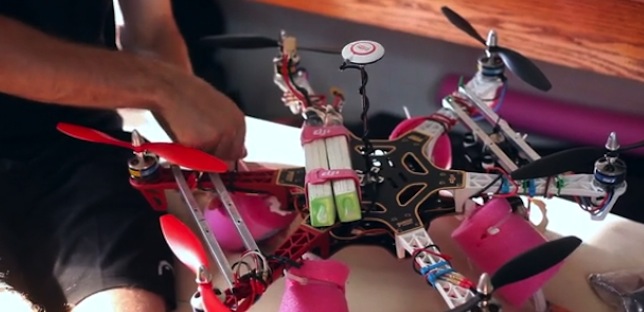Funding, Grants & Awards
Olin College-Built SnotBot Soon To Start Collecting
- By Dian Schaffhauser
- 08/31/15
SnotBot will soon take its first blow. The partnership between Olin College and the Ocean Alliance intended to use drone technology — the "bot" — to collect samples of blow —
the "snot" — from whales has succeeded in reaching and exceeding its Kickstarter goal of $225,000. That money is going to purchase and
construct new drones at Olin's Robotics lab to be used in three locations by scientists at the Ocean Alliance to gather data on the health and
wellbeing of three species of whales.
As Ocean Alliance CEO Iain Kerr explained in the Kickstarter video, traditional forms of whale monitoring cause stress and sometimes injury
to the animals. By using specially-designed drones, the researchers will be able to collect whale blow before it lands back in the ocean to
analyze DNA, measure stress and pregnancy hormone levels, determine virus and bacteria loads and perform other non-invasive experiments. The
collection process will take place in Patagonia, where southern right whales come to mate and breed; the Sea of Cortez, where sperm whales
gather; and Frederick Sound in Alaska, where humpback whales feed.

This isn't the only project Drew Bennet, an Olin associate professor of mechanical engineering, and his team of Olin students are working
on. There's also SnotShot, a machine that makes simulated whale blows on command from a remote device, and Sailbot, a multi-year endeavor to
design and build autonomous sailboats for college competitions.
Pearson, which sponsored the work, was brought into the project as well through two
of its science authors, Kenneth Miller and Joseph Levine, who write a popular biology textbook.
"Once in a while, dedicated people catalyze positive change in unexpected ways. And every now and then, out-of-the-box thinking creates a
new use for existing technology with the potential to transform our understanding of the living world," said Levine. "The folks at the Ocean
Alliance and their collaborators at Olin College are dedicated people, and their 'SnotBot' project has the potential to revolutionize our
understanding of whales and, by extension, the marine environments in which they play a crucial role."
About the Author
Dian Schaffhauser is a former senior contributing editor for 1105 Media's education publications THE Journal, Campus Technology and Spaces4Learning.

